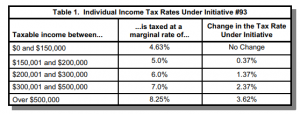 With the deadline passed, the Secretary of State’s office has 30 days to certify whether these measures will qualify for the November ballot so voters can decide how to spend more of your money.
With the deadline passed, the Secretary of State’s office has 30 days to certify whether these measures will qualify for the November ballot so voters can decide how to spend more of your money.
There are two transportation measures. Initiative 153 is backed by the Denver Metro Chamber of Commerce and other groups on the Western Slope, which would raise $800 million the first year through a sales tax that would go for unspecified road projects.
That effort collected 198,261 signatures.
Then there’s Initiative 167, also known as “Fix Our Damn Roads” and is backed by the Independence Institute. They don’t want to raise taxes, and instead it calls for spending to be reprioritized to cover roads and could raise $5.6 billion. Critics say that’s not enough to cover the state’s needs.
“Fix Our Damn Roads” brought in more than 150,000 signatures.
Initiative 173, or as we call it, the “Stop Jared Polis” measure, raises the cap on political contributions when a candidate is running against a millionaire funding their own campaign. Like Jared Polis.
If the millionaire contributes at least $1 million to their own campaign, their opponents get to raise more money from individual contributors.
Unfortunately, this one won’t go into effect soon enough to stop Polis, who has donated about $10 million to himself to elect himself governor. More than 212,000 signatures were turned in for this effort.
Initiative 93 would raise our personal income taxes by a lot and corporate taxes by a little to fund full-day kindergarten and other stuff labeled public schools. They collected 179,000 signatures.
Initiative 126 would cap payday loans at 36 percent, and that effort turned in 188,045 signatures.
We also reported that Colorado Rising turned in 170,000 signatures to block energy development.
Those they seek to hurt, landowners who would lose their property rights, turned in 209,000 signatures to support Initiative 108 — just compensation for reduction in fair market value by government law or regulation. Go team.
All of the measures require 98,492 valid voter signatures, now a random sample of signatures will be examined by the Secretary of State, and we’ll know in a month what we’re voting on in November.

